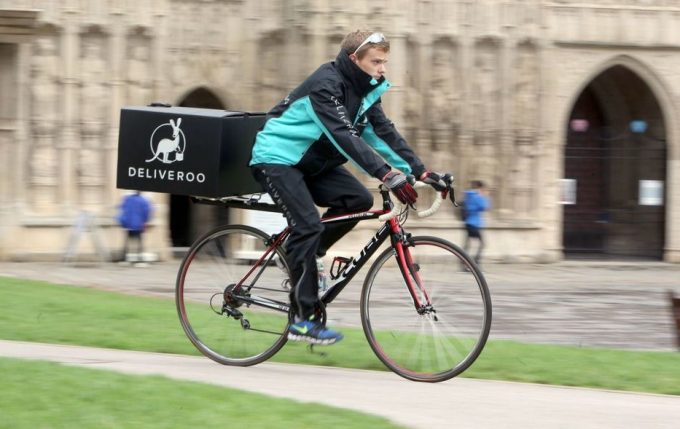Deliveroo sparked a rebellion among a section of its London delivery workers after trying to impose a unilateral change to their pay structure. It was going to change from £7 per hour plus £1 per each delivery to a straight £3.75 per delivery.
In essence this was a change from a fairly regular and reliable paycheque to payment on piecework rates. If Deliveroo users were to choose not to order much food, some Deliveroo delivery workers could find themselves earning under the minimum wage, yet they weren’t responsible for generating overall customer demand. The advantages seemed to be all stacked up in the employer’s favour.
Although Deliveroo claimed the change had received a warm response when they crowdsourced initial reactions to the idea, either they crowdsourced among an atypical sample of their delivery workers or their claim was no more than a bit of loose-lipped ‘management speak’ after the event.
Either way, they have backtracked and claim they are offering their workers the choice of which pay deal they want to be on. The issue has brought under a spotlight a bigger question of whether the delivery workers are employees or self-employed, but is this trend the best way for employment and remuneration to develop in the crowd economy?
It’s of course not confined to Deliveroo. Several of the new disruptor brands that have shaken up the ways of doing things by traditional businesses are hailed as part of a great new dawning of flexible employment, deliverers of a work/life balance where individuals can create lifestyle patterns and targets to suit themselves. Though some workers claim bullying tactics force them to work longer hours than they wish to.
And there are wider implications. Cash savings for Uber users mean less income for the families of ‘regular’ taxi drivers; greater use of Airbnb can reduce prospects for hotel workers.
I’m not being resistant to change and trying to put disruptor brands back in the genie’s bottle, but the ‘caring sharing’ ethos that’s meant to be part of the crowd economy sometimes seems to have quickly worn a bit thin.
History can give us some lessons. I live near to London’s Docklands, today a thriving centre for international finance. Up until fifty years ago international trade here meant the arrival of ships from around the world loaded with goods. Canary Wharf was for ships arriving from the Canary Islands with fruit and vegetables. And irregular workers paid on a piecework basis carried out the job of unloading the pre-containerised cargoes.
 This is The George, a traditional pub on London’s Isle of Dogs, close to the former Millwall Dock that’s now home to a sailing and watersports centre. It’s popular with local residents, some of whom have lived there long enough to remember the scenes that used to take place in the street outside the pub up to the 1960s.
This is The George, a traditional pub on London’s Isle of Dogs, close to the former Millwall Dock that’s now home to a sailing and watersports centre. It’s popular with local residents, some of whom have lived there long enough to remember the scenes that used to take place in the street outside the pub up to the 1960s.
When dockyards needed extra workers to unload ships they sent lorries round to several places where dockers would congregate early in the mornings in the hope of being offered work.
When faced with a hungry family at home it really was survival of the fittest, and street fights were commonplace as dockers competed to get a place in the back of a lorry for the privilege of a day’s work. Pieceworkers in the docks did dangerous, tiring, physical work for irregular pay with no sickness benefits and no paid holidays.
It’s a story of a different London to the Swinging Sixties and Carnaby Street. So maybe let’s be careful what we wish for if the transformation of established business models made possible through mass personal connectivity creates business opportunities where entrepreneurs try to rely on piecework employees they want to be classified as self-employed.
A crowdfunding project quickly started raising money to replace wages lost by Deliveroo delivery workers who went on strike in protest, and they are being encouraged to join the Couriers and Logistics Branch of the Independent Workers Union, IWGB CLB.
Update on 30 October 2016
Today the UK’s Sunday Times reported that following last week’s landmark ruling by a UK employment tribunal that Uber drivers are not self-employed, and should receive the minimum wage plus holiday pay and breaks, the law firm that won the case confirmed they are in talks with workers at Deliveroo: “Bicycle couriers push for staff rights.”
In its Editorial in the same issue the newspaper warned against the risks of over-legislation stifling the gig-economy. Many journalists have for years been self-employed writers and are perhaps better able to manage issues such as lack of holiday and sickness pay, having some savings to cover emergency costs and periods of not working, and completing self-assessment tax returns. I’m not quite so sure the majority of Uber drivers or Deliveroo workers are as educationally equipped or financially well rewarded to be able to plan careers in the same manner with such a degree of personal choice over their work/life balance.




0 Comments